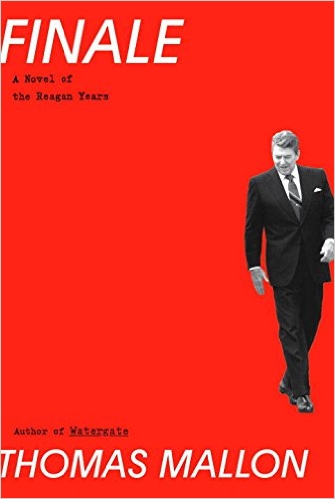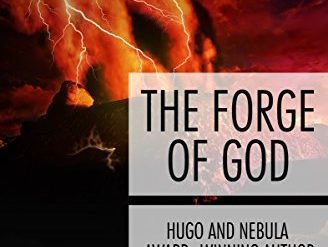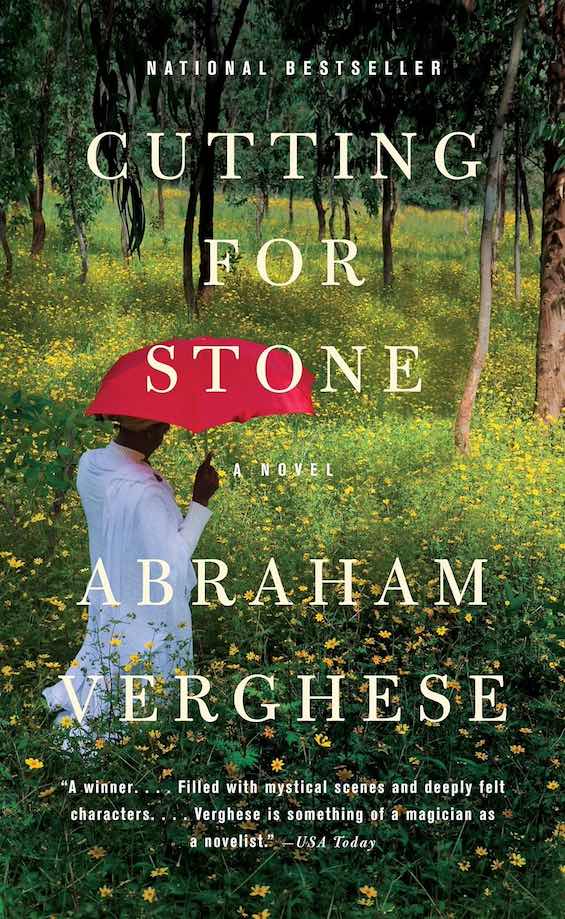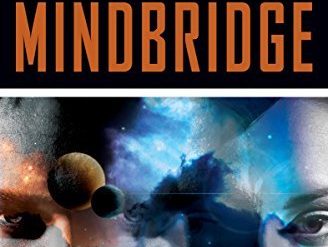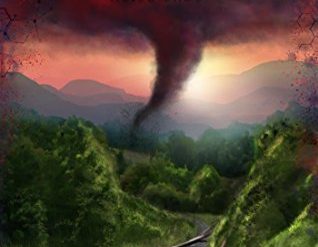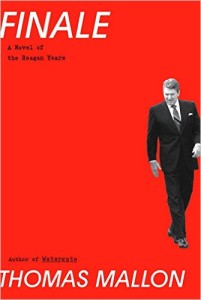
Estimated reading time: 5 minutes
Fair warning: I’m a lifelong political junkie. I vividly recall an argument with my little brother about the Dewey-Truman campaign in 1948, when I was seven. (Arthur called the President “Twu-man.”) So, I can’t approach any historical treatment about politics, fictional or not, except on the basis of my own political perspective. Just so you know: I am not and never have been a card-carrying member of the Republican Party.
Ronald Reagan through a glass, darkly
In Thomas Mallon’s new novel, Finale: A Novel of the Reagan Years, our fortieth President emerges as an enigmatic figure. Alternately muddle-headed and brilliantly articulate, Mallon’s Reagan is hard to read. In the author’s telling, Nancy Reagan sums up her view of the man after half a century of marriage in that spirit: “she didn’t know who he was, and she never had.” Another character in the novel remarks in conversation that “‘he’s the most impersonally warm man I’ve ever encountered. [His staff] won’t know how to figure him out.'” Yet another looked on him as “the most deeply shallow man she’d ever met.”
Finale: A Novel of the Reagan Years by Thomas Mallon (2015) 560 pages ★★★★★
The novel opens with a prologue set at the 1976 Republican National Convention, when Reagan was narrowly nosed out of the nomination by the appointed President, Gerald Ford. Quickly, then, the action shifts to a decade later, midway through Reagan’s second term. Much of the story then revolves around two seminal events in his Presidency. First among these was the Reykjavik Summit with Mikhail Gorbachev, where the two world leaders flirted with an end to nuclear weapons. The novel’s climax comes with the Iran-Contra scandal. This debacle, which many observers (including me) thought to be even more egregious a violation of ethics and the law than Watergate, raised serious questions about whether the President himself had been aware of the highly illegal actions of his staff. At any rate, the blame fell on Reagan’s National Security Adviser, Admiral John Poindexter, and Col. Oliver North on the NSC staff, who were selling arms to Iran and channeling the profits to the U.S.-backed Nicaraguan opposition called the Contras.
Historical fiction at its best
Throughout Finale, Thomas Mallon takes the reader into the minds of Reagan himself, Nancy Reagan, and a host of other historical figures. The detail is extraordinary, the accuracy of his observations difficult to challenge. However, most of the action is viewed through the perspective of several fictional characters whom Mallon places on the periphery of events.
Among the real-world figures Mallon portrays are Pamela Harriman, widow of former Ambassador to Moscow and London and former New York Governor W. Averill Harriman; Richard Nixon; former UN Ambassador Jeanne Kirkpatrick; Christopher Hitchens, the acerbic British journalist who wrote extensively (and brilliantly) about politics on both sides of the Atlantic; the multimillionaire publisher of the wildly successful TV Guide, Walter Annenberg; former White House Chief of Staff Mike Deaver; late-night talk-show host and multimillionaire investor Merv Griffin; and a number of less well-known and less consequential individuals.
Fascinating characters
Mallon succeeds in making every one of his characters interesting. However, to my mind, the most engaging by far were Pamela Harriman, Christopher Hitchens, Jeanne Kirkpatrick, and two fictional characters, Anders little (a minor staffer on the NSC) and Anne Macmurray Cox (the antinuclear activist ex-wife of a Right-Wing Republican activist and donor). Harriman and Hitchens were, in fact, fascinating characters in real life. For all I know, Jeane Kirkpatrick was, too.
Harriman, born Pamela Digby in the UK to an aristocratic family, married Winston Churchill’s son Randolph in 1939, as World War II was getting underway. Their son took his grandfather’s name and went on to an undistinguished career in Conservative politics. Seven years later she divorced Churchill and married a leading Broadway producer. Eleven years after that she married a wartime fling, W. Averill Harriman, who died in 1986 as the story progressed. Inheriting $100 million from her fourth husband, she reinvented herself as a Democratic king-maker, operating through the Political Action Committee she founded and ran, Democrats for the 80s, familiarly known as PamPAC.
Hitchens regarded himself as a socialist throughout much of his long career but turned away from the Left following 9/11, raising many eyebrows with his vociferous support of the Iraq War. In more recent times he was best known for his outspoken atheist views. Mallon portrays him as a cynical observer of the human comedy, an unusually bright reporter, and a magician with the English language who seemed incapable of uttering an uninteresting sentence.
About the author
Thomas Mallon has written seven historical novels among a total of sixteen books. He has won numerous awards for his work, both fiction and nonfiction.
Mallon’s two most recent novels look into the final years in the White House of Richard Nixon and Ronald Reagan. Perhaps Mallon chose them as subjects since they both merit treatment as tragic figures. However, there’s a hint of Mallon’s personal politics in his having ghostwritten Vice President Dan Quayle’s memoir. So, are we likely to see a future novel about Barack Obama’s two terms? Somehow, I doubt that.
For more great reading
This is one of The five best novels about politics and of the 10 best historical novels set in America.
I’ve also reviewed four other political novels by Thomas Mallon:
- Watergate (Watergate through a novelist’s eyes)
- Fellow Travelers (Thomas Mallon on America’s third Red Scare)
- Dewey Defeats Truman (A terrific political history novel)
- Landfall (A novelist’s sympathetic portrait of George W. Bush)
If you enjoy reading history in fictional form, check out 20 most enlightening historical novels. And if you’re looking for exciting historical novels, check out Top 10 historical mysteries and thrillers.
You might also care to take a look at the Top 10 nonfiction books about politics.
And you can always find my most popular reviews, and the most recent ones, on the Home Page.

